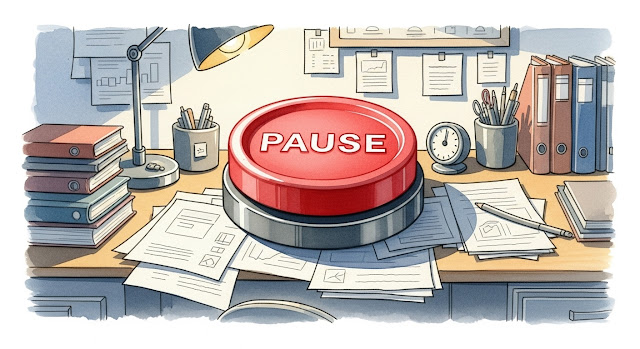Ever found yourself staring blankly at a complex tutorial, a stubborn line of code, or even a boss fight that just won't quit? That heavy, fuzzy feeling of mental exhaustion is a universal truth for anyone pushing their cognitive limits. Whether you're learning a new language, wrestling with a tricky bug, or grinding through levels, the brain drain is real.
But here's the secret: exhaustion isn't a sign of weakness; it's a signal. And learning to listen to that signal, and how to effectively combat it, is a skill as vital as any coding language or game strategy.
The Silent Drain: Why Our Brains Get So Tired
Learning new topics, especially complex ones like programming languages, constantly fires up new neural pathways. Figuring out code demands intense focus, problem-solving, and often debugging – a relentless cycle of trial and error. Even gaming, especially strategic or competitive titles, requires rapid decision-making, pattern recognition, and sustained attention.
This constant high-level cognitive load leads to:
- Decision Fatigue: Every choice, big or small, saps energy.
- Information Overload: Too much new data, too quickly.
- Mental Blockage: The feeling of being "stuck" when your brain just can't connect the dots anymore.
The good news? You can fight back.
Your Recharge Toolkit: Tips, Hacks, & Smart Breaks
Overcoming exhaustion isn't just about sleeping more (though that's crucial!). It's about how you structure your work, your breaks, and your self-care.
1. The Art of the Strategic Pause: Break Like a Pro
Don't just wait until you're completely burnt out. Plan your breaks.
- The Pomodoro Technique (or similar): Work intensely for 25 minutes, then take a 5-minute break. After four "pomodoros," take a longer 15-30 minute break. This structured approach prevents deep exhaustion.
- Micro-Breaks are Mighty: Every 20-30 minutes, look away from your screen for 20 seconds at something 20 feet away (the 20-20-20 rule for eye strain). Stand up, stretch, or grab a glass of water. These tiny resets add up.
- Physical Movement: A short walk, some jumping jacks, or a quick stretching routine can do wonders. Physical activity gets blood flowing to your brain and helps clear mental cobwebs.
- Sensory Reset: Step outside for a breath of fresh air. Listen to a different kind of music (or silence). Engage a different sense to pull your mind away from the screen.
2. Smart Learning & Coding Habits: Prevent the Burn
Adjust how you approach the work itself to reduce fatigue.
- Chunk It Down: Don't try to tackle an entire chapter or a massive coding project at once. Break it into the smallest possible digestible chunks. Focus on one small concept or one tiny feature at a time.
- Switch It Up: If you're stuck on a coding problem, try switching to a different language, a different type of learning (e.g., watching a video instead of reading), or even another light, unrelated task. Sometimes a new perspective is all you need.
- Active Over Passive: Reading documentation endlessly can be draining. Try to code along, experiment, or build small projects as you learn. Active engagement keeps your brain more stimulated and less fatigued.
- Talk It Out (Rubber Duck Debugging): Explaining a problem to an inanimate object (or a patient friend!) can often help you identify the solution yourself. It forces you to organize your thoughts.
3. Gaming Wisely: Play as a Recharge, Not a Drain
Gaming can be a great break, but it can also become another source of exhaustion if not managed.
- Set Time Limits: Just like work, set a timer for your gaming session. When it's up, step away, especially if it's a competitive game.
- Know When to Walk Away: If a game is becoming frustrating, leading to anger or intense concentration without fun, it's time for a pause. Don't push through "just one more level" if it's adding to your mental load.
- Vary Your Play: If you've been playing a high-intensity action game, switch to something more relaxed or puzzle-oriented for your next session.
4. Fueling Your Brain & Body: The Non-Negotiables
These are foundational for sustained energy, not just for coding or gaming.
- Prioritize Sleep: This cannot be stressed enough. Consistent, quality sleep is when your brain literally cleans itself and consolidates learning. Don't sacrifice it for "one more hour."
- Hydrate Relentlessly: Dehydration is a huge cause of brain fog and fatigue. Keep a water bottle handy and sip frequently.
- Smart Snacking & Nutrition: Avoid sugar crashes. Opt for brain-friendly snacks like nuts, fruit, or yogurt. Regular, balanced meals are vital.
- Optimize Your Environment: Good lighting (natural light is best), a comfortable ergonomic setup, and a clutter-free workspace can reduce mental friction and physical discomfort. Minimize distractions.
Overcoming exhaustion isn't about brute force; it's about intelligent self-management. By integrating strategic breaks, smart work habits, and essential self-care into your daily routine, you'll find yourself not only less tired but also more effective, creative, and joyful in your learning, coding, and gaming adventures. Listen to your brain – it knows when it needs a break!

